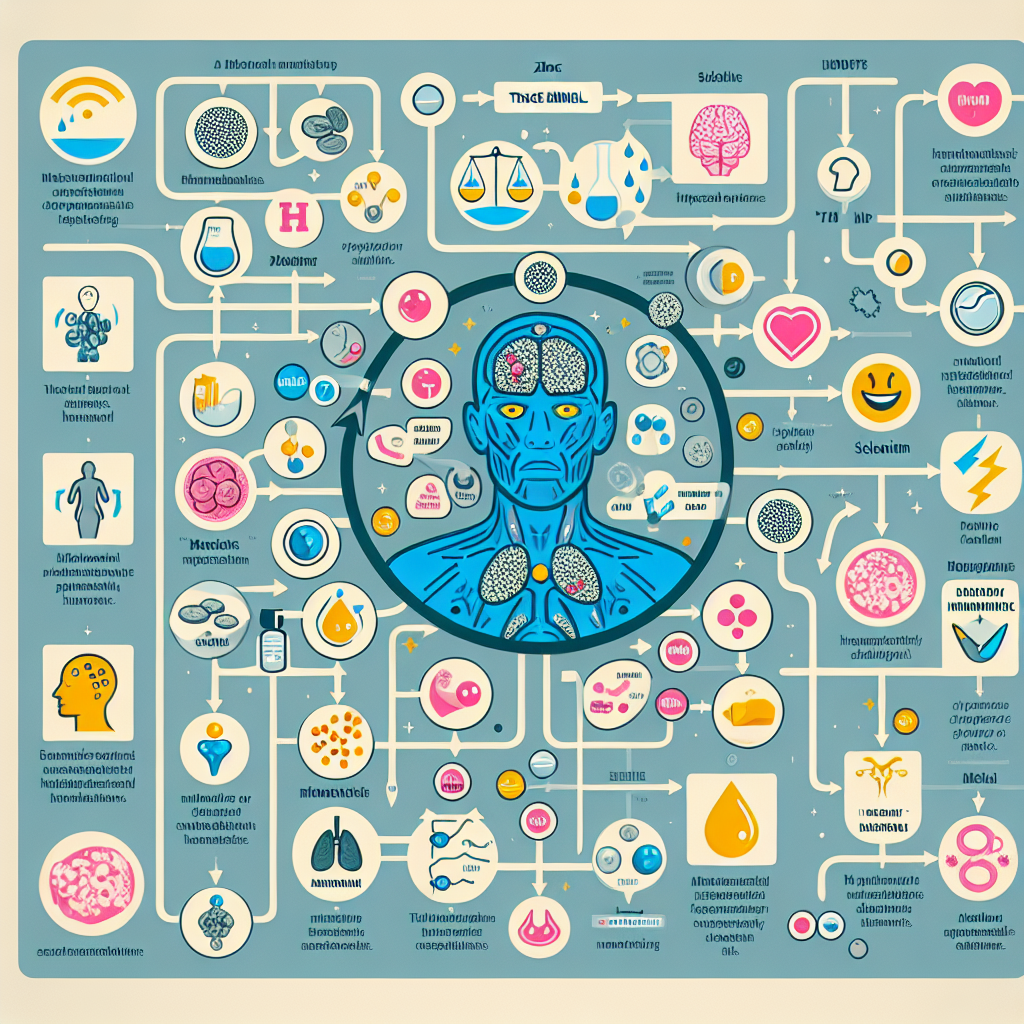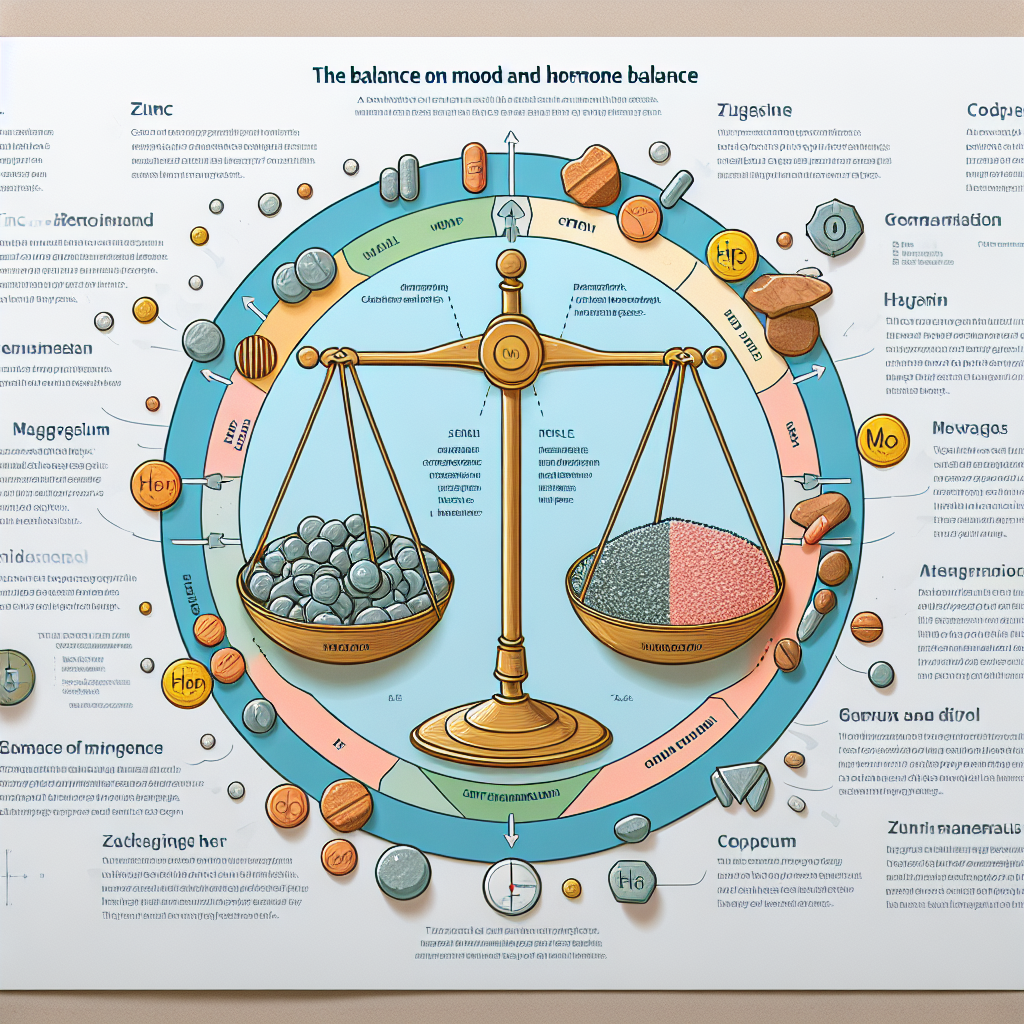The Role of Trace Minerals in Mood and Hormone Balance

Discover the crucial role of trace minerals in mood and hormone balance. Learn how these essential nutrients can help improve your overall well-being. Visit My Vibrant Vitality now to start your journey towards a healthier and happier life.
Exploring the Impact of Trace Minerals on Mood Regulation
The role of trace minerals in mood and hormone balance is a fascinating area of study that has been gaining increasing attention in recent years. Trace minerals, as the name suggests, are minerals that are required by the human body in minute amounts. Despite their small quantities, they play a crucial role in maintaining optimal health and well-being. Among their many functions, trace minerals are known to influence mood regulation and hormone balance, two factors that are integral to our mental and emotional health.
To understand the impact of trace minerals on mood regulation, it is essential to first comprehend the complex interplay between our brain, hormones, and emotions. Our mood is largely governed by certain chemicals in the brain, known as neurotransmitters. These neurotransmitters, such as serotonin, dopamine, and norepinephrine, are responsible for transmitting signals between nerve cells, thereby influencing our feelings of happiness, sadness, anxiety, and stress. Hormones, on the other hand, are chemical messengers that regulate various bodily functions, including our emotional responses.
Trace minerals, including zinc, magnesium, and selenium, among others, play a pivotal role in the production and functioning of these neurotransmitters and hormones. For instance, zinc is known to influence the production of neurotransmitters and hormones that regulate mood and stress responses. A deficiency in zinc can lead to an imbalance in these chemicals, potentially leading to mood disorders such as depression and anxiety.
Similarly, magnesium plays a crucial role in the conversion of tryptophan to serotonin, a neurotransmitter that is often referred to as the ‘feel-good’ hormone due to its role in promoting feelings of happiness and well-being. A deficiency in magnesium can therefore lead to reduced serotonin levels, potentially resulting in mood disorders such as depression and anxiety.
Selenium, another trace mineral, is known to influence the functioning of the thyroid gland, which produces hormones that regulate metabolism, growth, and mood. A deficiency in selenium can lead to thyroid dysfunction, potentially resulting in mood disorders and other health issues.
The role of trace minerals in mood regulation and hormone balance is further underscored by numerous studies that have found a correlation between trace mineral deficiencies and mood disorders. For instance, a study published in the Journal of Affective Disorders found that individuals with depression had significantly lower levels of zinc and magnesium compared to healthy individuals. Similarly, a study published in the Journal of Clinical Psychiatry found that individuals with bipolar disorder had significantly lower levels of selenium compared to healthy individuals.
These findings highlight the importance of maintaining optimal levels of trace minerals for mood regulation and hormone balance. This can be achieved through a balanced diet that includes a variety of foods rich in these minerals, such as nuts, seeds, whole grains, and leafy green vegetables. In some cases, supplementation may be necessary, particularly for individuals with specific dietary restrictions or health conditions that may affect the absorption of these minerals.
In conclusion, trace minerals play a crucial role in mood regulation and hormone balance, and a deficiency in these minerals can potentially lead to mood disorders. Therefore, maintaining optimal levels of these minerals through a balanced diet or supplementation is essential for our mental and emotional health. As research in this area continues to evolve, it is hoped that a greater understanding of the role of trace minerals in mood and hormone balance will lead to more effective strategies for the prevention and treatment of mood disorders.
Understanding the Role of Trace Minerals in Hormone Balance

Trace minerals, though required in minute quantities, play a pivotal role in maintaining our overall health. They are involved in numerous physiological processes, including hormone production and balance, which in turn significantly influence our mood and overall well-being. Understanding the role of trace minerals in hormone balance can provide valuable insights into how we can optimize our health and manage mood disorders.
Hormones, the body’s chemical messengers, regulate numerous bodily functions, including growth, metabolism, and mood. They are produced by various glands in the endocrine system, such as the thyroid, adrenal glands, and the pituitary gland. The production and release of these hormones need to be finely tuned to ensure the body functions optimally. This is where trace minerals come into play.
Trace minerals like zinc, selenium, iodine, and magnesium are essential for the synthesis and regulation of hormones. For instance, the thyroid gland, which produces hormones that regulate metabolism, growth, and development, requires iodine to function properly. A deficiency in iodine can lead to hypothyroidism, a condition characterized by fatigue, weight gain, and depression. Similarly, the adrenal glands, which produce stress hormones like cortisol, require adequate levels of zinc and selenium for optimal function. A deficiency in these minerals can lead to adrenal fatigue, resulting in symptoms like chronic fatigue, anxiety, and mood swings.
Magnesium, another crucial trace mineral, plays a significant role in the production of serotonin, a hormone that regulates mood, sleep, and appetite. Low levels of magnesium have been linked to depression and anxiety. Moreover, magnesium is also involved in the regulation of the stress response, further emphasizing its importance in mood regulation.
In addition to their direct role in hormone production and regulation, trace minerals also influence hormone balance indirectly through their role in gut health. The gut microbiome, the community of microorganisms living in our intestines, has been found to significantly influence our mood and mental health. This is often referred to as the gut-brain axis. Trace minerals like zinc and magnesium are essential for maintaining a healthy gut microbiome, which in turn influences the production of neurotransmitters like serotonin and dopamine that regulate mood.
Furthermore, trace minerals also play a role in the detoxification processes in the liver, which is essential for hormone balance. The liver is responsible for breaking down excess hormones and toxins, and deficiencies in trace minerals can impair this function, leading to hormonal imbalances.
In conclusion, trace minerals play a crucial role in hormone balance, which significantly influences our mood and overall well-being. Ensuring adequate intake of these minerals through a balanced diet or supplementation can help optimize hormone production and regulation, support gut health, and promote liver detoxification, thereby contributing to mood balance and mental health. However, it’s important to remember that while trace minerals are essential for health, they are required in small amounts, and excessive intake can be harmful. Therefore, it’s always advisable to consult with a healthcare professional before starting any supplementation regimen.
The Connection between Trace Minerals, Mood Disorders, and Hormonal Imbalance
Trace minerals, though required in minute quantities, play a pivotal role in maintaining our overall health. They are involved in numerous physiological processes, including the regulation of mood and hormonal balance. The connection between trace minerals, mood disorders, and hormonal imbalance is a fascinating area of study that has garnered significant attention in recent years.
Trace minerals such as zinc, magnesium, and selenium are essential for the proper functioning of our bodies. They are involved in various biochemical reactions, including those that regulate our mood and hormones. For instance, zinc is crucial for the production of neurotransmitters, which are chemical messengers that transmit signals in the brain. A deficiency in zinc can lead to mood disorders such as depression and anxiety. Similarly, magnesium plays a vital role in the production of serotonin, a neurotransmitter that contributes to feelings of well-being and happiness. A lack of magnesium can result in low serotonin levels, leading to mood disorders.
Moreover, selenium is another trace mineral that is essential for the proper functioning of the thyroid gland, which regulates our metabolism and hormone production. A deficiency in selenium can lead to thyroid disorders, which can, in turn, result in hormonal imbalances and mood disorders. Therefore, maintaining adequate levels of these trace minerals is crucial for our mental health and hormonal balance.
However, the modern diet, high in processed foods and low in nutrient-dense whole foods, often fails to provide these essential trace minerals. This deficiency can lead to a host of health problems, including mood disorders and hormonal imbalances. Therefore, it is crucial to ensure that we are getting enough of these trace minerals through our diet or through supplementation if necessary.
Furthermore, research has shown that supplementation with these trace minerals can help alleviate mood disorders and restore hormonal balance. For instance, studies have shown that supplementation with zinc can help reduce symptoms of depression and anxiety. Similarly, magnesium supplementation has been found to improve mood and reduce symptoms of depression. Additionally, selenium supplementation has been shown to improve thyroid function and reduce symptoms of mood disorders.
However, it is important to note that while supplementation can be beneficial, it should not replace a balanced diet. The best way to ensure that we are getting enough of these trace minerals is to consume a diet rich in whole foods, such as fruits, vegetables, whole grains, and lean proteins. These foods are naturally rich in these trace minerals and can provide a host of other health benefits as well.
In conclusion, trace minerals play a crucial role in regulating our mood and hormones. A deficiency in these minerals can lead to mood disorders and hormonal imbalances. Therefore, it is essential to ensure that we are getting enough of these minerals through our diet or through supplementation if necessary. By doing so, we can help maintain our mental health and hormonal balance, thereby improving our overall well-being.